Books on consciousness
A list of books relating to the hard problem of consciousness. Regularly updated cos I keep finding new stuff all the time.
A list of books relating to the hard problem of consciousness. Regularly updated cos I keep finding new stuff all the time.
2006
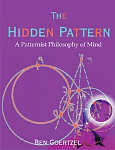 Ben Goertzel
Ben Goertzel
The Hidden Pattern: A Patternist Philosophy of Mind
(BrownWalker Press 2006)
Presents a novel conceptual framework to understand the diverse aspects of mind and intelligence in a unified way. Minds and the world they live in and co-create are viewed as patterned systems of patterns, evolving over time – various aspects of subjective experience and individual and social intelligence are analyzed in detail in this light. See Universal Publishers | Amazon | Google
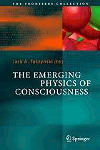 Jack A. Tuszynski (ed.)
Jack A. Tuszynski (ed.)
The Emerging Physics of Consciousness
(Springer 2006)
How do the feelings and sensations of conscious experience arise from the actions of nerve cells and their synaptic and molecular processes? On the assumption that consciousness can be understood by modern physics and other sciences, the essays in this volume present a range of opinions, allowing readers to decide which are most likely to succeed. See Springer | Amazon | Google
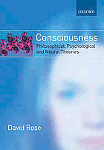 David Rose
David Rose
Consciousness: Philosophical, Psychological and Neural Theories
(Oxford 2006)
What makes us conscious? What neural processes drive our awareness and how do they relate to what we think of as our mind? Rose offers his readers a wealth of information to draw upon. The book integrates studies from philosophy, psychology, and neuroscience to capture the major themes on which our current understanding of consciousness is based. See Oxford | Amazon | Google
 Max Jammer
Max Jammer
Concepts of Simultaneity: From Antiquity to Einstein and Beyond
(Johns Hopkins 2006)
A comprehensive, accessible account of the historical development of a controversial concept from the days of Egyptian hieroglyphs through to Einstein’s work and beyond. The central theme is an analysis of the use of this concept by philosophers of science and its role in inaugurating modern theoretical physics in Einstein’s special theory of relativity. See Johns Hopkins | Amazon | Google
 Craig Bourne
Craig Bourne
A Future for Presentism
(Oxford 2006)
Presentism, the view that only the present exists, was a much neglected position in the philosophy of time for a number of years. Recently, however, it has been enjoying a renaissance among philosophers. This book is meant as a timely contribution to this fast growing and exciting debate. See Oxford | Amazon | Google
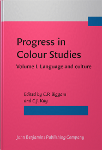 Carole P. Biggam & Christian Kay (eds.)
Carole P. Biggam & Christian Kay (eds.)
Progress in Colour Studies: Volume I. Language and Culture
(John Benjamins 2006)
Along with its companion volume, this book offers a fascinating glimpse into the current avenues of research into colour. The majority of the papers originated in a 2004 conference entitled ‘Progress in Colour Studies’ which was held in the University of Glasgow. The contributions to this first volume are principally linguistic and anthropological in content. See John Benjamins | Amazon | Google
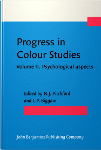 Nicola Pitchford & Carole P. Biggam (eds.)
Nicola Pitchford & Carole P. Biggam (eds.)
Progress in Colour Studies: Volume II. Psychological Aspects
(John Benjamins 2006)
The study of colour attracts researchers from a wide range of disciplines. This volume, principally psychological in content, focuses on the development of colour perception and colour language, from infancy into adulthood, across a diverse range of cultures, including English, Himba, Chinese and Mexican, and on the intriguing yet perplexing condition of synaesthesia. See John Benjamins | Amazon | Google
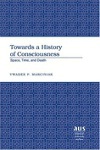 Vwadek P. Marciniak
Vwadek P. Marciniak
Towards a History of Consciousness: Space, Time, and Death
(Peter Lang 2006)
An analysis of our postmodern ontology reveals deep but neglected roots. What are these and how did they grow? Is there a self without consciousness? What relates the self to the individual? Does the recognition of death contribute to the growth of consciousness? Marciniak provides a compelling discussion of the neglected topic of the history of consciousness. See Peter Lang | Amazon | Google
 Jonathan Bricklin (ed.)
Jonathan Bricklin (ed.)
Sciousness
(Eirini Press 2006)
William James’s notion of pure experience, which he termed sciousness – consciousness without the self – was used by the philosopher Kitaro Nishida to explain Zen tathata (suchness) to the Japanese themselves. As this collection of James’s essays makes clear, Western practitioners of Zen may claim their spiritual inheritance from the “father of American psychology.” See Eirini | Amazon | Google
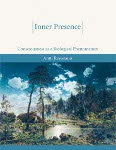 Antti Revonsuo
Antti Revonsuo
Inner Presence: Consciousness as a Biological Phenomenon
(MIT 2006)
Revonsuo proposes a novel approach to consciousness that draws on philosophy, psychology and cognitive neuroscience. Arguing that any fruitful approach must consider both the subjective psychological reality of consciousness and the objective neurobiological reality, he proposes the strategy of “biological realism,” using tools of the empirical biological sciences. See MIT | Amazon | Google
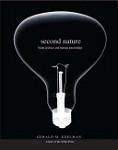 Gerald M. Edelman
Gerald M. Edelman
Second Nature: Brain Science and Human Knowledge
(Yale 2006)
Advancements in brain science are opening up new perspectives on how we acquire knowledge. Indeed, it is now possible to explore consciousness – the very center of human concern – by scientific means. Edelman offers a new theory of knowledge based on striking scientific findings about the brain and foresees a day when brain-based devices will be conscious. See Yale | Google | Amazon
 Torin Alter & Sven Walter (eds.)
Torin Alter & Sven Walter (eds.)
Phenomenal Concepts and Phenomenal Knowledge: New Essays on Consciousness and Physicalism
(Oxford 2006)
Phenomenal knowledge is knowledge of conscious experience. Phenomenal concepts are concepts associated with that knowledge: those that express phenomenal qualities from the subject’s perspective. What is the nature of such knowledge and concepts? How are they related to physical knowledge and physical concepts? These and similar questions occupy this volume. See Oxford | Google
 Alan Gilchrist
Alan Gilchrist
Seeing Black and White
(Oxford 2006)
How the human visual system determines the lightness of a surface – its whiteness, blackness, or grayness – is a mystery. The light reflected by a surface does not reveal its shade of gray. Depending upon the illumination, a surface of any shade of gray can reflect any amount of light. This is the first comprehensive survey of empirical work on lightness over the past 150 years. See Oxford | Google
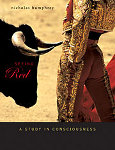 Nicholas Humphrey
Nicholas Humphrey
Seeing Red: A Study in Consciousness
(Harvard 2006)
Consciousness matters. Arguably it matters more than anything. The purpose of this book is to build towards an explanation of just what the matter is. Nicholas Humphrey begins this compelling exploration of the biggest of big questions with a challenge to the reader, and himself. What’s involved in “seeing red”? See Harvard | Google
 Paul S. MacDonald
Paul S. MacDonald
History of the Concept of Mind, Volume 2
(Ashgate 2006)
MacDonald continues his monumental investigation of the history of ideas. This volume takes us from Ancient Egypt, the Ancient Near East and the Zoroastrian religion, through the secret teachings in the Hermetic and Gnostic scriptures, into the transformation of ideas about mind, soul and spirit in the late antique and early medieval epochs. See Ashgate | Amazon | Google
 Galen Strawson
Galen Strawson
Consciousness and its Place in Nature
(Imprint 2006)
For the last five years Strawson has provoked a mixture of shock and scepticism with his carefully argued case that physicalism entails panpsychism. In this book, Strawson provides the fullest and most careful statement of his position to date, throwing down the gauntlet to his critics by inviting them to respond in print. See Imprint | Google | Amazon | Jerry Fodor review
 Jean Matter Mandler
Jean Matter Mandler
The Foundations of Mind: Origins of Conceptual Thought
(Oxford 2006)
Mandler presents a new theory of cognitive development in infancy, focusing on the processes through which perceptual information is transformed into concepts. Countering both strong nativist and empiricist views, Mandler paints a new picture of the abilities and accomplishments of infants and the development of the mind. See Oxford | Google | Amazon
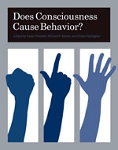 Pockett, Banks & Gallagher (eds.)
Pockett, Banks & Gallagher (eds.)
Does Consciousness Cause Behavior?
(MIT 2006)
Our intuition tells us that we, our conscious selves, cause our own voluntary acts. Yet scientists have long questioned this. New experimental evidence has brought the causal status of human behavior back to the forefront of intellectual discussion. This multidisciplinary collection advances the debate from a variety of perspectives. See MIT Press | Google | Amazon
 U. Kriegel & K. Williford (eds.)
U. Kriegel & K. Williford (eds.)
Self-Representational Approaches to Consciousness
(MIT 2006)
In this pioneering collection, leading theorists examine the self-representational theory of consciousness, which holds that consciousness always involves some form of self-awareness. This stands as an alternative to the the representational theory of consciousness and the higher-order monitoring theory, combining elements of both in a way that may avoid the deficiencies of each. See MIT | Google | Amazon
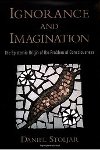 Daniel Stoljar
Daniel Stoljar
Ignorance and Imagination: The Epistemic Origin of the Problem of Consciousness
(Oxford 2006)
The correct response to the problem of consciousness, Stoljar argues, is not to posit a realm of experience distinct from the physical, nor to deny the reality of phenomenal experience, nor to rethink our understanding of consciousness and the language we use to talk about it. Instead, we should view the problem as a consequence of our ignorance of the relevant physical facts. See Oxford | Google | Amazon
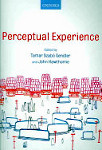 T. Gendler & J. Hawthorne (eds.)
T. Gendler & J. Hawthorne (eds.)
Perceptual Experience
(Oxford 2006)
In the last few years there has been an explosion of philosophical interest in perception. This volume presents new work by fifteen of the world’s leading philosophers. The essays cover sensation and representation, consciousness and awareness, and the connections between perception and knowledge and between perception and action. See Oxford U Press | Google | Amazon
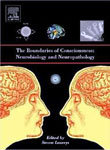 Steven Laureys (ed.)
Steven Laureys (ed.)
The Boundaries of Consciousness: Neurobiology and Neuropathology
(Elsevier 2006)
This volume (Progress in Brain Research, vol. 150) confronts the latest theory in the scientific study of consciousness with recent empirical data on altered states of consciousness like brain death, coma, vegetative state, minimally conscious state, locked-in syndrome, dementia, epilepsy, schizophrenia, hysteria, general anesthesia, sleep, hypnosis, and hallucinations. See Amazon | Google
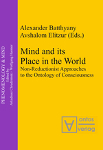 A. Batthyany & A. Elitzur (eds.)
A. Batthyany & A. Elitzur (eds.)
Mind and its Place in the World – Non-Reductionist Approaches to the Ontology of Consciousness (Ontos Verlag 2006)
Why are some brain processes accompanied by conscious awareness? This anthology points out new and unexamined paths of consciousness research. By presenting a wide spectrum of non-reductive theories, it endeavours to overcome the dichotomy between dualism and monism in favour of new and more differentiated positions. See Ontos Verlag | Notre Dame Philosophical Reviews | Google
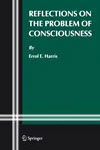 Errol E. Harris
Errol E. Harris
Reflections on the Problem of Consciousness
(Springer 2006)
The essential and most puzzling problem of consciousness is how the electrochemical activity constantly occurring in the brain translates into the conscious experience we enjoy. In this study, Harris considers attempts by several important neuroscientists and philosophers to address the question and makes his own suggestions as to how the problem is best approached. See Amazon | Google
 Anthony Freeman (ed.)
Anthony Freeman (ed.)
Radical Externalism – Honderich’s Theory of Consciousness Discussed
(Imprint 2006)
What is consciousness? ‘Devout physicalism’ reduces consciousness to the physical while ‘spiritualism’ takes it out of space and into mystery. Neither is convincing, and the reason, according to Honderich, lies in the persistent belief that consciousness really is different. Hence his new theory of “consciousness as existence,” critically examined here by eleven leading philosophers. See Imprint | Amazon
 Hane Htut Maung
Hane Htut Maung
Consciousness: An Enquiry Into the Metaphysics of the Self
(Lulu 2006)
This book provides a philosophical analysis of the mind-body problem and the nature of consciousness. In the face of contemporary dogma, it argues against physicalism, and instead proposes a position called idealistic dualism, which acknowledges consciousness for what it is: our very existence. See Lulu | Amazon
 Jonathan C. W. Edwards
Jonathan C. W. Edwards
How Many People are There in My Head? And in Hers? – An Exploration of Single Cell Consciousness
(Imprint 2006)
Edwards proposes that the only possible solution to the ‘mind-brain’ problem is that each nerve cell is conscious separately and that we have no other ‘global’ consciousness. We are colonies of sentient micro-organisms, each unaware of the sentience of the others, led to believe it is ‘me.’ This counterintuitive idea resolves several paradoxes hidden in the closets of brain research laboratories. See Imprint | Amazon | Google

The Hidden Pattern: A Patternist Philosophy of Mind
(BrownWalker Press 2006)
Presents a novel conceptual framework to understand the diverse aspects of mind and intelligence in a unified way. Minds and the world they live in and co-create are viewed as patterned systems of patterns, evolving over time – various aspects of subjective experience and individual and social intelligence are analyzed in detail in this light. See Universal Publishers | Amazon | Google

The Emerging Physics of Consciousness
(Springer 2006)
How do the feelings and sensations of conscious experience arise from the actions of nerve cells and their synaptic and molecular processes? On the assumption that consciousness can be understood by modern physics and other sciences, the essays in this volume present a range of opinions, allowing readers to decide which are most likely to succeed. See Springer | Amazon | Google

Consciousness: Philosophical, Psychological and Neural Theories
(Oxford 2006)
What makes us conscious? What neural processes drive our awareness and how do they relate to what we think of as our mind? Rose offers his readers a wealth of information to draw upon. The book integrates studies from philosophy, psychology, and neuroscience to capture the major themes on which our current understanding of consciousness is based. See Oxford | Amazon | Google

Concepts of Simultaneity: From Antiquity to Einstein and Beyond
(Johns Hopkins 2006)
A comprehensive, accessible account of the historical development of a controversial concept from the days of Egyptian hieroglyphs through to Einstein’s work and beyond. The central theme is an analysis of the use of this concept by philosophers of science and its role in inaugurating modern theoretical physics in Einstein’s special theory of relativity. See Johns Hopkins | Amazon | Google

A Future for Presentism
(Oxford 2006)
Presentism, the view that only the present exists, was a much neglected position in the philosophy of time for a number of years. Recently, however, it has been enjoying a renaissance among philosophers. This book is meant as a timely contribution to this fast growing and exciting debate. See Oxford | Amazon | Google

Progress in Colour Studies: Volume I. Language and Culture
(John Benjamins 2006)
Along with its companion volume, this book offers a fascinating glimpse into the current avenues of research into colour. The majority of the papers originated in a 2004 conference entitled ‘Progress in Colour Studies’ which was held in the University of Glasgow. The contributions to this first volume are principally linguistic and anthropological in content. See John Benjamins | Amazon | Google

Progress in Colour Studies: Volume II. Psychological Aspects
(John Benjamins 2006)
The study of colour attracts researchers from a wide range of disciplines. This volume, principally psychological in content, focuses on the development of colour perception and colour language, from infancy into adulthood, across a diverse range of cultures, including English, Himba, Chinese and Mexican, and on the intriguing yet perplexing condition of synaesthesia. See John Benjamins | Amazon | Google

Towards a History of Consciousness: Space, Time, and Death
(Peter Lang 2006)
An analysis of our postmodern ontology reveals deep but neglected roots. What are these and how did they grow? Is there a self without consciousness? What relates the self to the individual? Does the recognition of death contribute to the growth of consciousness? Marciniak provides a compelling discussion of the neglected topic of the history of consciousness. See Peter Lang | Amazon | Google

Sciousness
(Eirini Press 2006)
William James’s notion of pure experience, which he termed sciousness – consciousness without the self – was used by the philosopher Kitaro Nishida to explain Zen tathata (suchness) to the Japanese themselves. As this collection of James’s essays makes clear, Western practitioners of Zen may claim their spiritual inheritance from the “father of American psychology.” See Eirini | Amazon | Google

Inner Presence: Consciousness as a Biological Phenomenon
(MIT 2006)
Revonsuo proposes a novel approach to consciousness that draws on philosophy, psychology and cognitive neuroscience. Arguing that any fruitful approach must consider both the subjective psychological reality of consciousness and the objective neurobiological reality, he proposes the strategy of “biological realism,” using tools of the empirical biological sciences. See MIT | Amazon | Google

Second Nature: Brain Science and Human Knowledge
(Yale 2006)
Advancements in brain science are opening up new perspectives on how we acquire knowledge. Indeed, it is now possible to explore consciousness – the very center of human concern – by scientific means. Edelman offers a new theory of knowledge based on striking scientific findings about the brain and foresees a day when brain-based devices will be conscious. See Yale | Google | Amazon

Phenomenal Concepts and Phenomenal Knowledge: New Essays on Consciousness and Physicalism
(Oxford 2006)

Phenomenal knowledge is knowledge of conscious experience. Phenomenal concepts are concepts associated with that knowledge: those that express phenomenal qualities from the subject’s perspective. What is the nature of such knowledge and concepts? How are they related to physical knowledge and physical concepts? These and similar questions occupy this volume. See Oxford | Google

Seeing Black and White
(Oxford 2006)

How the human visual system determines the lightness of a surface – its whiteness, blackness, or grayness – is a mystery. The light reflected by a surface does not reveal its shade of gray. Depending upon the illumination, a surface of any shade of gray can reflect any amount of light. This is the first comprehensive survey of empirical work on lightness over the past 150 years. See Oxford | Google

Seeing Red: A Study in Consciousness
(Harvard 2006)

Consciousness matters. Arguably it matters more than anything. The purpose of this book is to build towards an explanation of just what the matter is. Nicholas Humphrey begins this compelling exploration of the biggest of big questions with a challenge to the reader, and himself. What’s involved in “seeing red”? See Harvard | Google

History of the Concept of Mind, Volume 2
(Ashgate 2006)
MacDonald continues his monumental investigation of the history of ideas. This volume takes us from Ancient Egypt, the Ancient Near East and the Zoroastrian religion, through the secret teachings in the Hermetic and Gnostic scriptures, into the transformation of ideas about mind, soul and spirit in the late antique and early medieval epochs. See Ashgate | Amazon | Google

Consciousness and its Place in Nature
(Imprint 2006)
For the last five years Strawson has provoked a mixture of shock and scepticism with his carefully argued case that physicalism entails panpsychism. In this book, Strawson provides the fullest and most careful statement of his position to date, throwing down the gauntlet to his critics by inviting them to respond in print. See Imprint | Google | Amazon | Jerry Fodor review

The Foundations of Mind: Origins of Conceptual Thought
(Oxford 2006)

Mandler presents a new theory of cognitive development in infancy, focusing on the processes through which perceptual information is transformed into concepts. Countering both strong nativist and empiricist views, Mandler paints a new picture of the abilities and accomplishments of infants and the development of the mind. See Oxford | Google | Amazon

Does Consciousness Cause Behavior?
(MIT 2006)

Our intuition tells us that we, our conscious selves, cause our own voluntary acts. Yet scientists have long questioned this. New experimental evidence has brought the causal status of human behavior back to the forefront of intellectual discussion. This multidisciplinary collection advances the debate from a variety of perspectives. See MIT Press | Google | Amazon

Self-Representational Approaches to Consciousness
(MIT 2006)
In this pioneering collection, leading theorists examine the self-representational theory of consciousness, which holds that consciousness always involves some form of self-awareness. This stands as an alternative to the the representational theory of consciousness and the higher-order monitoring theory, combining elements of both in a way that may avoid the deficiencies of each. See MIT | Google | Amazon

Ignorance and Imagination: The Epistemic Origin of the Problem of Consciousness
(Oxford 2006)
The correct response to the problem of consciousness, Stoljar argues, is not to posit a realm of experience distinct from the physical, nor to deny the reality of phenomenal experience, nor to rethink our understanding of consciousness and the language we use to talk about it. Instead, we should view the problem as a consequence of our ignorance of the relevant physical facts. See Oxford | Google | Amazon

Perceptual Experience
(Oxford 2006)

In the last few years there has been an explosion of philosophical interest in perception. This volume presents new work by fifteen of the world’s leading philosophers. The essays cover sensation and representation, consciousness and awareness, and the connections between perception and knowledge and between perception and action. See Oxford U Press | Google | Amazon

The Boundaries of Consciousness: Neurobiology and Neuropathology
(Elsevier 2006)
This volume (Progress in Brain Research, vol. 150) confronts the latest theory in the scientific study of consciousness with recent empirical data on altered states of consciousness like brain death, coma, vegetative state, minimally conscious state, locked-in syndrome, dementia, epilepsy, schizophrenia, hysteria, general anesthesia, sleep, hypnosis, and hallucinations. See Amazon | Google

Mind and its Place in the World – Non-Reductionist Approaches to the Ontology of Consciousness (Ontos Verlag 2006)
Why are some brain processes accompanied by conscious awareness? This anthology points out new and unexamined paths of consciousness research. By presenting a wide spectrum of non-reductive theories, it endeavours to overcome the dichotomy between dualism and monism in favour of new and more differentiated positions. See Ontos Verlag | Notre Dame Philosophical Reviews | Google

Reflections on the Problem of Consciousness
(Springer 2006)

The essential and most puzzling problem of consciousness is how the electrochemical activity constantly occurring in the brain translates into the conscious experience we enjoy. In this study, Harris considers attempts by several important neuroscientists and philosophers to address the question and makes his own suggestions as to how the problem is best approached. See Amazon | Google

Radical Externalism – Honderich’s Theory of Consciousness Discussed
(Imprint 2006)
What is consciousness? ‘Devout physicalism’ reduces consciousness to the physical while ‘spiritualism’ takes it out of space and into mystery. Neither is convincing, and the reason, according to Honderich, lies in the persistent belief that consciousness really is different. Hence his new theory of “consciousness as existence,” critically examined here by eleven leading philosophers. See Imprint | Amazon

Consciousness: An Enquiry Into the Metaphysics of the Self
(Lulu 2006)
This book provides a philosophical analysis of the mind-body problem and the nature of consciousness. In the face of contemporary dogma, it argues against physicalism, and instead proposes a position called idealistic dualism, which acknowledges consciousness for what it is: our very existence. See Lulu | Amazon

How Many People are There in My Head? And in Hers? – An Exploration of Single Cell Consciousness
(Imprint 2006)

Edwards proposes that the only possible solution to the ‘mind-brain’ problem is that each nerve cell is conscious separately and that we have no other ‘global’ consciousness. We are colonies of sentient micro-organisms, each unaware of the sentience of the others, led to believe it is ‘me.’ This counterintuitive idea resolves several paradoxes hidden in the closets of brain research laboratories. See Imprint | Amazon | Google
Menu
 What’s a logical paradox?
What’s a logical paradox? Achilles & the tortoise
Achilles & the tortoise The surprise exam
The surprise exam Newcomb’s problem
Newcomb’s problem Newcomb’s problem (sassy version)
Newcomb’s problem (sassy version) Seeing and being
Seeing and being Logic test!
Logic test! Philosophers say the strangest things
Philosophers say the strangest things Favourite puzzles
Favourite puzzles Books on consciousness
Books on consciousness Philosophy videos
Philosophy videos Phinteresting
Phinteresting Philosopher biographies
Philosopher biographies Philosopher birthdays
Philosopher birthdays Draft
Draftbarang 2009-2024  wayback machine
wayback machine
 wayback machine
wayback machine